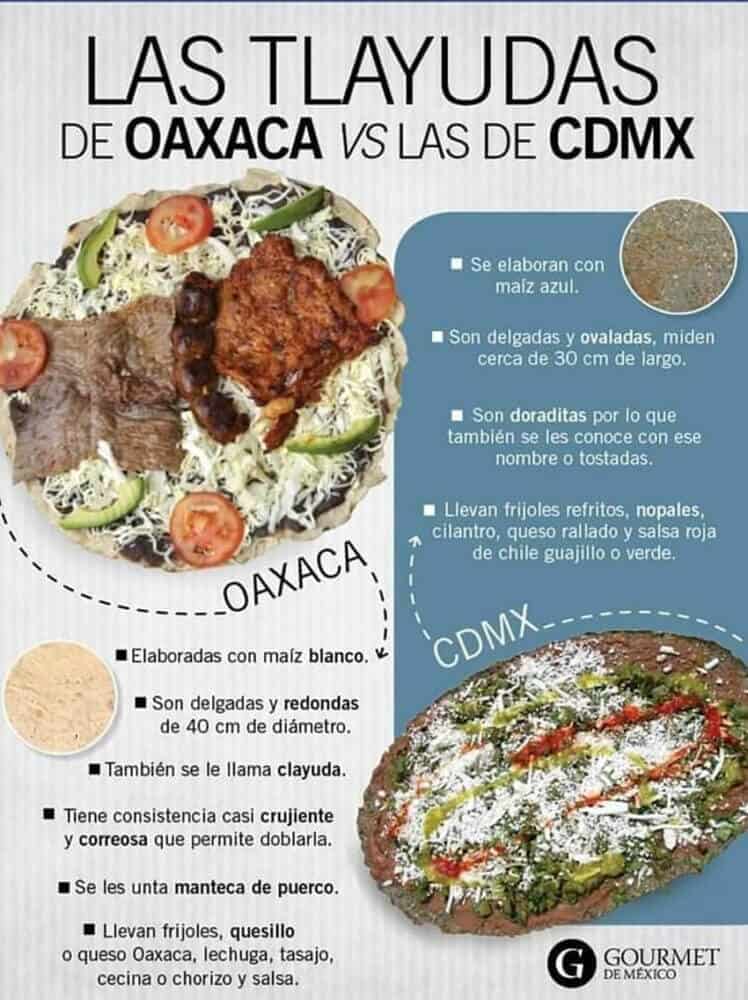When is a tlayuda not a tlayuda? When it is in fact a doradita, according to some social media users.
Tlayudas, a regional food from Oaxaca that are part of the antojitos (little cravings) family of tortilla-based snacks, are currently in the spotlight after footage of a woman selling them at the Felipe Ángeles International Airport (AIFA) on Monday went viral.
Some social media users asserted that the woman was not selling tlayudas but rather doraditas – antojitos also known as tlayudas that are sold on the streets of México state and Mexico City, especially on and around the zócalo, the capital’s central square.
A tlayuda oaxaqueño, also known as a clayuda, is a crispy, large, round tortilla heated on a comal (griddle) and topped with hot and cold ingredients such as lard, beans, meat (chorizo, tasajo and cecina are common), queso oaxaca (Oaxaca cheese), avocado, radish and salsa.
A doradita, also known as a huarache toluqeño, is an oval-shaped crispy blue corn tortilla commonly topped with cold ingredients including beans, chopped nopales (cactus pads), cilantro, cheese, onion and salsa roja or verde (red or green chili sauce).
Despite the obvious differences between a tlayuda oaxaqueña and a doradita, the latter is also commonly called a tlayuda, and was referred to as such in many media reports about the entrepreneurship of the AIFA doradita vendor, who sold the snacks to hungry passengers who had few other food options at the new airport.
Linguist Yasnáya Elena Gil, a Oaxaca native and Mixe speaker, weighed in on the debate about whether doraditas can also be called tlayudas, writing on Facebook that both snacks can indeed be referred to as tlayudas.
“Both are tlayudas. A lot of people from the Valley of México have called what the woman was selling in the new airport tlayudas. It’s like mole – the first time that I ate mole in a town near Texcoco, [México state], I thought that it would be like the mole I always ate in Oaxaca but it wasn’t. It was very different because there are different kinds of mole just as there are different kinds of tlayudas. Both are tlayudas, calm down,” she wrote.
“One is not more original than the other, nor would it be the first time that someone uses the same name for …two things that are different in one aspect and similar in others,” Gil added.
She also said that the word tlayuda has been used interchangeably with doradita for at least four decades in central Mexico.
“So now it’s also its name, such are linguistic phenomena. … They are also tlayudas if there is a community of speakers that calls them that,” Gil wrote.

According to a Spanish language text written by the academics Michael Swanton and Sebastián van Doesburg, the word tlayuda comes from the adjective tlayudo, “which today means strong, tough, resistant.”
“The (tortilla) tlayuda/clayuda, therefore, contrasts with the soft (tortilla) and the toasted (tortilla),” they wrote, citing a 1982 book – Tradiciones Gastronómicas Oaxaqueñas – by Ana María Guzmán de Vásquez Colmenares.
The academics also wrote that the first written use of the word tlayuda they could find was in a novel set in Oaxaca that was published in 1890. Author Arturo Fenochio Rosas wasn’t referring to the tlayuda oaxaqueña as we know it today but rather used the word tlayudas to describe tortillas that had gone stale and thus become hard.
Mexico News Daily
